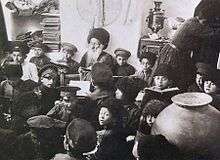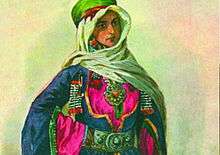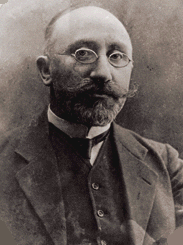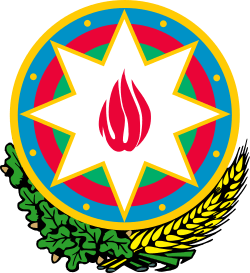History of the Jews in Azerbaijan
The history of the Jews in Azerbaijan dates back many centuries. Today, Jews in Azerbaijan mainly consist of three distinct groups: Mountain Jews, the most sizable and most ancient group; Ashkenazi Jews, who settled in the area during the late 19th-early 20th centuries, and during World War II; and Georgian Jews who settled mainly in Baku during the early part of the 20th century.
| Total population | |
|---|---|
| 10,000–100,000[1] | |
| Languages | |
| Hebrew (in Israel), Azerbaijani, Judeo-Tat, Russian | |
| Religion | |
| Judaism | |
| Related ethnic groups | |
| Mountain Jews, Ashkenazi Jews, Georgian Jews. |
Part of a series on the |
|---|
| History of Azerbaijan |
 |
|
Antiquity |
|
Middle Ages
|
|
Early modern history
|
|
|
Distribution
Historically, Jews in Azerbaijan have been represented by various subgroups, mainly Mountain Jews, Ashkenazi Jews and Georgian Jews. Azerbaijan at one point was or still is home to smaller communities of Krymchaks, Kurdish Jews and Bukharian Jews, as well Gerim (converts) and non-Jewish Judaistic groups like Subbotniks. In those days, Jews used to live in and around the city of Shamakhi (mainly in the village of Mücü), but the community has been non-existent since the early 1920s.[2] In 2002, the total number of Jewish residents in Azerbaijan was 10,000 people with about 5,500 of them being Mountain Jews.[3] A few more thousand descend from mixed families.[2] In 2010, the total Jewish population in Azerbaijan was 6,400.[4] Jews mainly reside in the cities of Baku, Ganja, Sumqayit, Quba, Oğuz, Goychay and the town of Qırmızı Qəsəbə, the only town in the world where Mountain Jews constitute the majority (and the only fully Jewish town outside of Israel).
History
Archaeological excavations carried out in 1990 resulted in the discovery of the remains of the 7th-century Jewish settlement near Baku, and of a synagogue 25 kilometres to the southeast of Quba.[2] The first religious meeting-house in Baku was built in 1832, and was reorganized into a synagogue in 1896; more synagogues were built in Baku and its suburbs in the late 19th century. The first choir synagogue in Baku opened in 1910.[5]
From the late 19th century, Baku became one of the centres of the Zionist movement in the Russian Empire.[5] The first Hovevei Zion was established here in 1891, followed by the first Zionist organization in 1899. The movement remained strong in the short-lived Democratic Republic of Azerbaijan (1918–1920) marked with the establishment of the Jewish Popular University in 1919, periodicals printed in Yiddish, Hebrew, Judæo-Tat and Russian, and a number of schools, social clubs, benevolent societies and cultural organizations.[2]
During the construction of a stadium in the town of Guba a mass grave was discovered. Two main wells and two canals with human bones were uncovered. The finds indicate that 24 skulls were of children, 28 were of women of various ages. Besides ethnic Azerbaijanis, there were also Jews and Lezgis killed and buried during March Days in 1918.[6] The names of 81 massacred Jewish civilians were found and confirmed.[7]
After Sovietization, all Zionism-related activities including those of cultural nature that were carried out in Hebrew were banned. In the early 1920s a few hundred Mountain Jewish families from Azerbaijan and Dagestan left for Israel and settled in Tel-Aviv. The next aliyah did not take place until the 1970s, after the ban on Jewish immigration to Israel was lifted (see: Refusenik (Soviet Union)). Between 1972 and 1978 around 3,000 people left Azerbaijan for Israel. 1970 was the demographic peak for Azerbaijani Jews after World War II; according to the census, 41,288 Jews resided in Azerbaijan that year.[2]
Many Jewish émigrés from Azerbaijan settled in Tel-Aviv and Haifa. There are relatively large communities of Mountain Jewish expatriates from Azerbaijan in New York City and Toronto.
A new Jewish synagogue, which became one of the biggest synagogues in Europe opened in Baku on 9 March 2003. There is also a Jewish school, operating in Azerbaijan since 2003. Currently, there are seven functioning synagogues in Azerbaijan: three in Baku, two in Quba and two in Oghuz.[8] Some of them were constructed with government financial support.[9] In January 2020, The Association of Mountain Jews opened a new community center in Moscow's Sokolniki Park.[10]
Mountain Jews


Different theories have been brought forward regarding the origin of Mountain Jews and the exact date of their settlement in the Caucasus. The commonly accepted theory views Mountain Jews as early medieval immigrants from Persia and possibly the Byzantine Empire forced out by Islamic conquests. They settled in Caucasian Albania, on the left bank of the Kura River and interacted with the Kypchak Kaganate of Khazaria, which lied to the north. It was through these early Jewish communities that the Khazars converted to Judaism making it their state religion.[2]
In the following centuries, Mountain Jews are believed to have moved further north making way to mass migration of Oguz Turks into the region. Their increase in number was supported by a constant flow of Jews from Iran. In the late Middle Ages Jews from Gilan founded a settlement in Oguz. Throughout the medieval epoch Mountain Jews were establishing cultural and economic ties with other Jewish communities of the Mediterranean. Agriculture and fabric trade was their main occupation until Sovietization. Some families practiced polygamy.[2] In 1730, Huseyn Ali, the ruler of the Quba Khanate (then newly separated from the Safavid Empire), issued a decree according to which Jews could own property in the khanate.[11]
According to the 1926 Soviet census, there were 7,500 Mountain Jews in Azerbaijan (roughly 25% of the country's entire Jewish population).[12] The exact numbers of the late Soviet period are unknown, since many were counted[13] or preferred to be counted[2] as Tats mostly due to the anti-Semitic attitude of the Soviet government. The theory of common origins of Tats and Mountain Jews (previously referred to as Judæo-Tats) has been vehemently dismissed by a number of researchers.[14][15]
Mountain Jews currently dominate the entire Jewish Diaspora of Azerbaijan. They speak a distinct dialect of the Tat language called Juhuri or Judæo-Tat. The majority speaks more than one language, the second and/or third one most often being Azeri or Russian.
Ashkenazi Jews
1811 is the year when the first Ashkenazi Jews settled in Baku, but their mass immigration to what is now Azerbaijan did not start until the 1870s. Their immigration was relatively steady leading them to outnumber the local Mountain Jewish community by 1910. They settled mostly in the booming oil-rich city of Baku. The Caspian-Black Sea Company, one of the leading oil companies in the Russian Empire, was established in Baku by the wealthy Rothschild family of German Jewish origin. Ashkenazi Jews continued immigrating to Azerbaijan until the late 1940s, with a number of them being World War II evacuees from Russia, Ukraine and Belarus who chose to stay in their country of refuge.[2]
Ashkenazi Jews were particularly active in Azerbaijani politics. Dr. Yevsey Gindes, a Kiev native, served as Minister of Health of the Democratic Republic of Azerbaijan (1918–1920). Along with that, 6 of the 26 Baku Commissars were Ashkenazi Jewish. In 1912 around one third of Baku's registered lawyers and physicians were Ashkenazi Jewish as well.[2]
The post-1972 aliyah largely affected this subgroup of Azerbaijani Jews, as among all they were more exposed to emigration. This resulted in the decline of their number, making Mountain Jews the largest Jewish group of Azerbaijan by the mid-1990s. Today there are about 500 Ashkenazi Jews living in the country.[16]
Similar to many immigrant communities of the Czarist and Soviet eras in Azerbaijan, Ashkenazi Jews appear to be linguistically Russified. The majority of Ashkenazi Jews speak Russian as their first language with Azeri being spoken as the second. The number of Yiddish-speakers is unknown.
Other Jewish subgroups
It is not clear whether local Jewish communities had established ties with Georgian Jews before the Czarist epoch, however by the 1910s the Georgian Jewish diaspora in Baku already accounted for its own educational club. Today there are a few hundreds of Georgian Jews living in Azerbaijan.[2]
In 1827 first groups of Judæo-Aramaic-speaking Kurdish Jews started settling in Azerbaijan. In 1919–1939 a synagogue for Kurdish Jews functioned in Baku. After Sovietization the attitude of the Stalinist Soviet government towards them was somewhat unfavourable, and in 1951 all Kurdish Jews were deported from the Caucasus.[2]
Krymchaks, who nowadays number only 2,500 people worldwide, consequently remained in quite low numbers in Azerbaijan throughout the 20th century. There were only 41 of them in the country in 1989. Bukharian Jews numbered 88 persons.[17]
Gerim and Subbotniks
Gerim and Subbotniks were ethnic Russians from various parts of Russia who converted to Judaism primarily in the 1820s. In 1839–1841 the Czarist government expelled these communities to the newly conquered South Caucasus, mainly to what is now Azerbaijan. Upon arriving here, they founded several settlements around Jalilabad (then called Astrakhan-Bazar), of which the largest one was Privolnoye, Azerbaijan. It later became the largest Judaistic Russian settlement in Russia. By the late Soviet epoch the overall number of Gerim and Subbotniks in Azerbaijan was 5,000. There were only around 200 of them left in 1997 (when the region was visited by a research group from Saint Petersburg) with many planning to move to Russia and leaving virtually no chance for further preservation of this unique community.[18]
Life of the community
In the Soviet era, Jews in Azerbaijan displayed high rates of marriage outside their community. In 1989, 48% of Ashkenazi Jews and 18% of Mountain Jews were married to non-Jews.[19]
Beginning in the 1960s, Azerbaijan's Jewish community experienced cultural revival. Jewish samizdat publications started being printed. Many cultural and Zionist organizations were reestablished in Baku and Sumqayit since 1987, and the first legal Hebrew courses in the Soviet Union were opened in Baku.[2]
Education in Jewish languages was discontinued by the Kremlin in the 1930s and the 1940s, and teaching in Yiddish and Juhuri was replaced by that in Russian. After the fall of the Soviet Union, a yeshiva opened in Baku in 1994 and an Ohr Avner Chabad Day School was established in 1999. In 1994, Hebrew was studied at one state university and offered as a course choice in two secondary schools.[2] On 31 May 2007, a groundbreaking ceremony for the construction of the Ohr Avner Chabad Centre for Jewish Studies took place in Baku. The centre is intended to include a day school, a kindergarten, residence halls, a scientific centre, a library, etc.[20]
According to the Report on Global Anti-Semitism released by the USA Bureau of Democracy, Human Rights, and Labor on 5 January 2005, "Cases of prejudice and discrimination against Jews in the country were very limited, and in the few instances of anti-Semitic activity the Government has been quick to respond. The Government does not condone or tolerate persecution of Jews by any party".[21] Jews do not suffer from discrimination, and the country is remarkably free from anti-Semitism.[22]
In 2005 Yevda Abramov, himself a Jew, was elected to the National Assembly of Azerbaijan as an MP representing the Rural Guba riding.
As of 2017, there are seven synagogues in Azerbaijan: three in Baku (one for each community, the Ashkenazi, Mountain and Georgian; the second one being the largest in the Caucasus), two in Qırmızı Qəsəbə near Quba, and two in Oğuz.[23]
A delegation of the World Jewish Congress visited Azerbaijan on September 2016 where during the talks with the Azeri President Ilham Aliyev emphasis was put on "Excellent relations with Jewish community and Israel".[24][25]
Azerbaijan was also visited by John Shapiro, executive director of the American Jewish Committee, in January 2017, shortly after the visit of Benjamin Netanyahu to Baku. During the interview, Shapiro said that "the delegation met with the Jewish community in Azerbaijan and saw they are very happy and feel very comfortable living in the country".[26]
Historical demographics
| Year | Pop. | ±% |
|---|---|---|
| 1886 | 10,357 | — |
| 1897 | 8,430 | −18.6% |
| 1926 | 59,768 | +609.0% |
| 1939 | 41,245 | −31.0% |
| 1959 | 46,091 | +11.7% |
| 1970 | 49,057 | +6.4% |
| 1979 | 44,345 | −9.6% |
| 1989 | 41,072 | −7.4% |
| 2002 | 7,900 | −80.8% |
| 2009 | 9,100 | +15.2% |
Source:
| ||
Azerbaijan's Jewish population significantly decreased between 1926 and 1939, but then didn't change much between 1939 and 1989 (it increased a little until 1970, and then decreased a little until 1989). Since 1989 and the fall of Communism, Azerbaijan's Jewish population has significantly decreased. Most of the Jews in Azerbaijan left and moved to other countries between 1989 and 2002, with most of them moving to Israel.[33]
Famous Azerbaijani Jews

- Albert Agarunov, Starshina of the Azerbaijani Army who died during the Nagorno-Karabakh War, National Hero of Azerbaijan. School no.154,which he graduated from, named after him.
- Bella Davidovich, American pianist.[34]
- Boris Vannikov, Soviet government and military official, a three-star General.
- Dov Gazit, chief-commander of the IAF (Israeli Air Force) Technical School in Haifa, while serving in Africa, he acquired a lion cub, which became the first lion in Dr. Aharon Shulov Jerusalem Biblical Zoo.
- Ella Leya, Azerbaijani-American composer, singer, and writer.[35]
- Emil Sutovsky, chess Grandmaster and the president of the Association of Chess Professionals.
- Garry Kasparov, Russian (formerly Soviet) chess Grandmaster, former World Chess Champion, writer, and political activist, considered by many to be the greatest chess player of all time.[36] (father's side)
- Gavriil Ilizarov, Soviet physician, known for inventing the Ilizarov apparatus for lengthening limb bones and for his eponymous surgery.
- God Nisanov, property developer, philanthropist and Vice President of the World Jewish Congress. [37]
- Lala Hasanova, science fiction writer.
- Larisa Dolina, Russian (former Soviet) jazz and pop singer and an actress.
- Lena Glaz, chess player, Israeli Woman International Master (WIM, 1985). She is a winner the Israeli Women's Chess Championship (1980).
- Lev Landau, physicist who made fundamental contributions to many areas of theoretical physics, he received the 1962 Nobel Prize.[38]
- Lev Nussimbaum, writer and journalist[39]
- Lotfi A. Zadeh, mathematician, electrical engineer, computer scientist, creator of "fuzzy logic" artificial intelligence researcher and professor emeritus of computer science at the University of California, Berkeley.(mother's side) buried at 1st Alley of Honor in Baku in 2017.
- Max Black, British-American philosopher, who was a leading influential figure in analytic philosophy in the first half of the twentieth century.
- Misha Black, British architect and designer.
- Mirra Komarovsky, American pioneer in the sociology of gender.[40]
- Mirza Khazar, author, political analyst, anchorman, radio journalist, publisher, and translator.
- Sarit Hadad, Israeli singer. In October 2009, the Israeli Music TV Channel (Channel 24) crowned Hadad "best female singer of the 2000s".[41]
- Solomon Grobshtein, One of the founders and organizers of the Azerbaijani oil industry.
- Tatiana Zatulovskaya, chess player, Woman Grandmaster, and the 1993 Senior Women's World Chess Champion.
- Telman Ismailov, Russian-Turkish entrepreneur and businessman
- Timur Rodriguez, Russian showman, singer, TV and radio personality.(mother's side)
- Valery Belenky, artistic gymnast, he won the team gold and all around bronze with the Unified Team in the 1992 Olympics in Barcelona.
- Vladimir Abramovich Rokhlin, mathematician
- Yagutil Mishiev, writer, author. The distinguished Teacher of the Republic of Dagestan and the Russian Federation.
- Yakov Zevin, Communist activist, one of the Bolshevik Party leaders in Azerbaijan during the Russian Revolution.
- Yevda Abramov, Member of the National Assembly of Azerbaijan[42] and Deputy chairman of Azerbaijani National Assembly's Committee on Human Rights, representing a part of Azerbaijani Jewish community.[43][44]
- Yevsey Gindes, statesman and pediatrician who served as the Minister of Healthcare of Azerbaijan Democratic Republic, and was member of Azerbaijani National Council and later Parliament of Azerbaijan.[45]
- Yosef Shagal, politician and former journalist, since 2012 he is the ambassador of Israel to Belarus.
- Yuli Gusman, film director and actor. He is the founder and CEO of the prestigious Nika Award.
- Zarakh Iliev, billionaire property developer.
- Zechariah Sitchin, author
See also
- Israel-Azerbaijan relations
- Synagogues in Azerbaijan
- Ohr Avner Chabad Day School (Baku)
- Mountain Jews
- Qırmızı Qəsəbə, the only completely Jewish town outside of Israel
- Religion in Azerbaijan
- Judaism by country
References
- "Azerbaijan Virtual Jewish History Tour". jewishvirtuallibrary.org. Retrieved 6 March 2017.
As of 2016, approximately 30,000 Jews live in Azerbaijan
- (in Russian) The Electronic Jewish Encyclopædia: Azerbaijan
- (in Russian) Ethnic Composition of Azerbaijan According to the 1999 Census by Arif Yunusov. Demoscope.ru
- "The Jewish Population of the World (2010)". Jewish Virtual Library., based on American Jewish Year Book. American Jewish Committee.
- (in Russian) The Electronic Jewish Encyclopædia: Baku
- "Б. Сафаров. Установить всех жертв поименно не удастся". Эхо. Archived from the original on 15 August 2011. Retrieved 9 June 2011.
- "Mass Grave Found in Northern Azerbaijan". Visions. Spring 2007. Archived from the original on 10 March 2016. Retrieved 9 June 2011.
- "Sinaqoqlar". scwra.gov.az. Retrieved 6 March 2017.
- "New synagogue ready for Passover". The European Azerbaijan Society. Retrieved 15 April 2017.
- "God Nisanov and Zarakh Iliev open Mountain Jews Community Center in Moscow". Arutz Sheva. 6 January 2020. Retrieved 3 February 2020.
- Azeri Jews: Centuries of coexistence in Azerbaijan by Gabriel Lerner. The Jewish Journal. 11 August 2007. Retrieved 23 February 2008
- The All-Soviet Population Census of 1926 Archived 3 February 2012 at WebCite. Demoscope.ru
- (in Russian) The Eurasian Jewish Congress: the Jewish Community of Azerbaijan Archived 27 September 2007 at the Wayback Machine
- (in Russian) From the History of the Jews of Dagestan Archived 28 September 2007 at the Wayback Machine by I.Semenov
- (in Russian) Polyethnicity in Dagestan by L.Landa
- В Баку схлестнулись горские и европейские евреи. Haqqin.az. 18 August 2016.
- "The All-Soviet Population Census of 1989: Azerbaijan". Demoscope.ru. Archived from the original on 26 August 2011. Retrieved 14 April 2013.
- Brief Report on the Expedition to Azerbaijan in June 1997 Archived 16 October 2007 at the Wayback Machine by V.Dymshits. Centre for the Creation of the Jewish Museum in Saint Petersburg
- Vyacheslav Konstantinov. Jewish Population of the Former USSR in the Twentieth Century (a social demographic analysis), p. 54. ISBN 9657088585, 9789657088586.
- (in Russian) Mehriban Aliyeva Participated in Groundbreaking for Jewish School. Day.az. 1 June 2007. Retrieved 25 June 2007
- "Report on Global Anti-Semitism released by the Bureau of Democracy, Human Rights, and Labor, January 5, 2005". State.gov. Retrieved 14 April 2013.
- United Nations High Commissioner for Refugees. "Azerbaijan: Update to AZE19547.E of 26 January 1995, on the treatment of Jews, particularly in Baku, and available protection, UNHCR". Unhcr.org. Retrieved 14 April 2013.
- "Sinaqoqlar". scwra.gov.az. Retrieved 6 March 2017.
- "World Jewish Congress". worldjewishcongress.org. World Jewish Congress. Retrieved 4 April 2017.
- "Ronald Lauder: I highly appreciate respectful and warm attitude of Azerbaijani people and Azerbaijani leadership towards Jewish community". Azertag. 16 September 2016. Retrieved 4 April 2017.
- "Azerbaijan-US-Israel partnership very important (exclusive)". Trend.Az (in Russian). 30 January 2017. Retrieved 4 April 2017.
- "население азербайджана". ethno-kavkaz.narod.ru.
- "Приложение Демоскопа Weekly". Demoscope.ru. 15 January 2013. Archived from the original on 12 October 2013. Retrieved 14 April 2013.
- "World Jewish Population, 2002" (PDF).
- "Powered by Google Docs". Google. Retrieved 14 April 2013.
- "Ethnic composition of Azerbaijan 2009". Pop-stat.mashke.org. 7 April 1971. Retrieved 22 December 2012.
- YIVO | Population and Migration: Population since World War I. Yivoencyclopedia.org. Retrieved 14 April 2013.
- "Archived copy" (PDF). Archived from the original (PDF) on 14 July 2014. Retrieved 14 April 2013.CS1 maint: archived copy as title (link)
- Adelson, Robert. "Biography: Bella Davidovich". AllMusic. Retrieved 25 April 2010.
- "Ella Leya: American Jazz By Way Of Azerbaijan". NPR. 1 April 2011. Retrieved 8 March 2016.
- Barden, Leonard (19 January 2008). "Bobby Fischer". The Guardian. Retrieved 3 February 2020.
Most experts place him the second or third best ever, behind Kasparov but probably ahead of Karpov.
- Papadopoulos, Anna (5 November 2019). "CEO Spotlight: Interview With Real Estate Mogul God Nisanov". ceoworld.biz. Retrieved 3 February 2020.
- Kapitza, P. L.; Lifshitz, E. M. (1969). "Lev Davydovitch Landau 1908-1968". Biographical Memoirs of Fellows of the Royal Society. 15: 140. doi:10.1098/rsbm.1969.0007.
- Abbas Abdulla, "Research" Nussimbaum is a Jew from Kyiv" in Adabiyyat Qazetti (Literature Qazette), No. 48:3643 (Baku: 19 December 2008), p.6 as quoted in "Frequently Asked Questions about the Authorship of Ali and Nino," FAQ No. 54: But was Lev Nussimbaum (Essad Bey) actually born in Baku?" in Azerbaijan International, Vol. 15:2–4 (2011), p. 65 and Endnote 119 on page 109.
- Rosenberg, Rosalind (2004). "Komarovsky, Mirra". In Ware, Susan (ed.). Notable American Women: A Biographical Dictionary Completing the Twentieth Century. Harvard University Press. pp. 349–351. ISBN 0-674-01488-X.
- Mitz'ad He-Asor (Decade Parade), Israeli Channel 24, October 2009.
- Milli Mejlis of Azerbaijan Republic – Abramov Yevda Sasunovich
- Lerner, Gabriel (11 January 2008). "Azeri Jews: Centuries of coexistence in Azerbaijan". The Jewish Journal of Greater Los Angeles. Retrieved 3 February 2020.
- Hilary Leila Krieger (16 May 2006). "Azerbaijan to open trade office in Israel". The Jerusalem Post. Retrieved 3 February 2020.
- "Гиндес Евсей Яковлевич – знаменитый бакинский детский врач" [Gindes Evsey Yakovlevich – famous Baku pediatrician]. Retrieved 14 November 2011.
External links
- Free Political Journal
- Official Web-Site of Azerbaijani Jews
- Humanitarian Association of Jewish Women of Azerbaijan
- Chabad centres in Azerbaijan
- Jewish Azerbaijan
- The Jewish Community of Azerbaijan, The Museum of the Jewish People at Beit Hatfutsot
- Union of Councils for Soviet Jews. FSUMonitor:Azerbaijan


